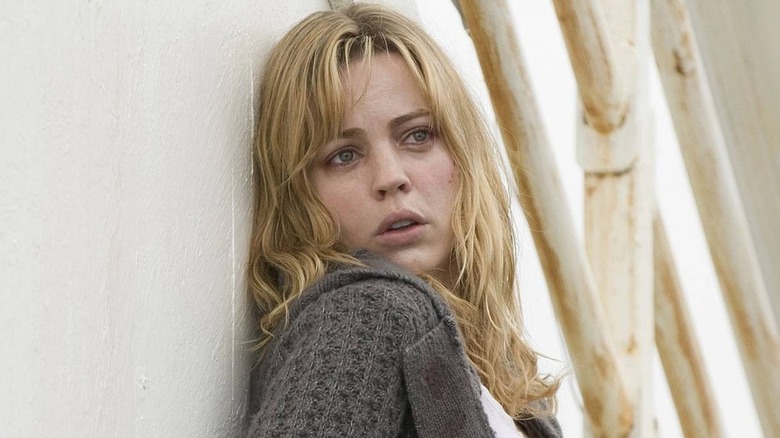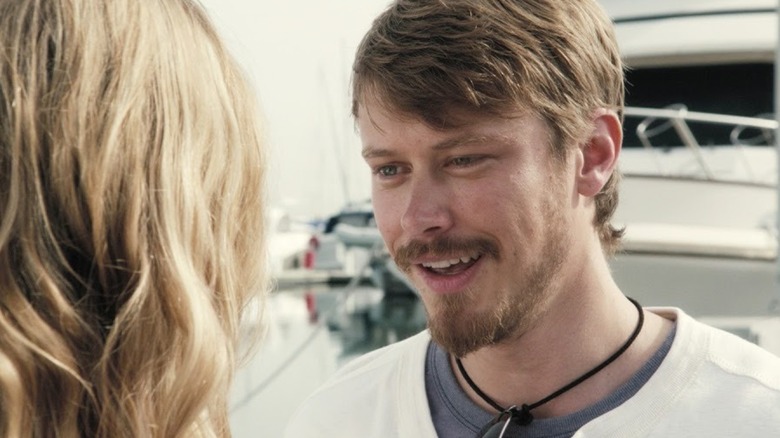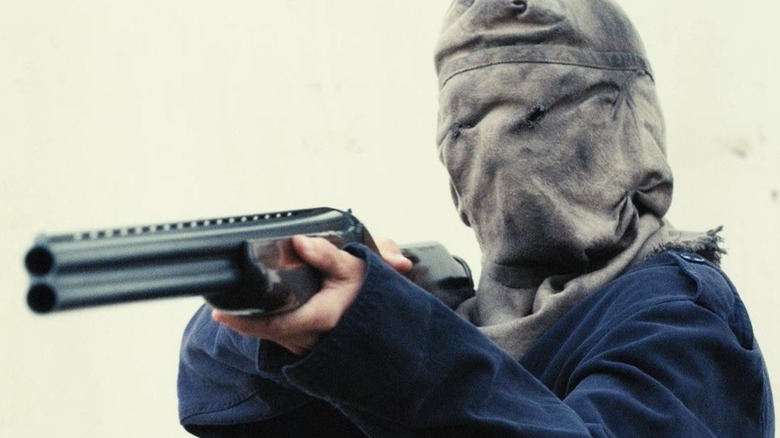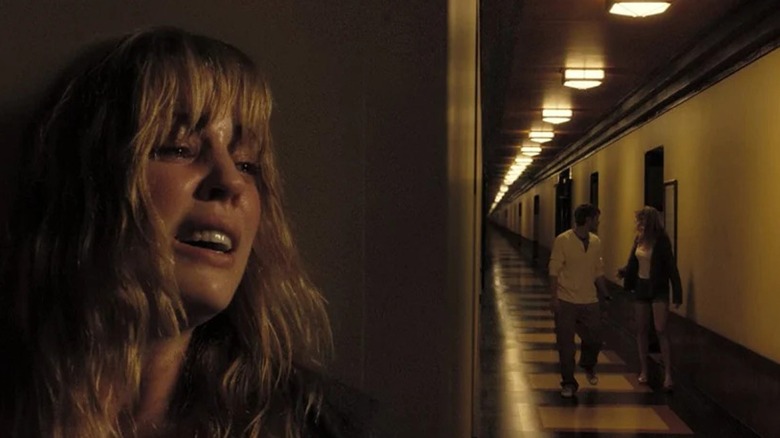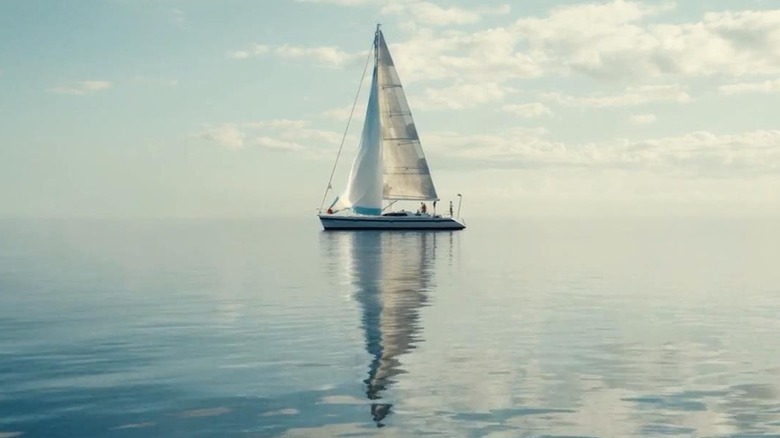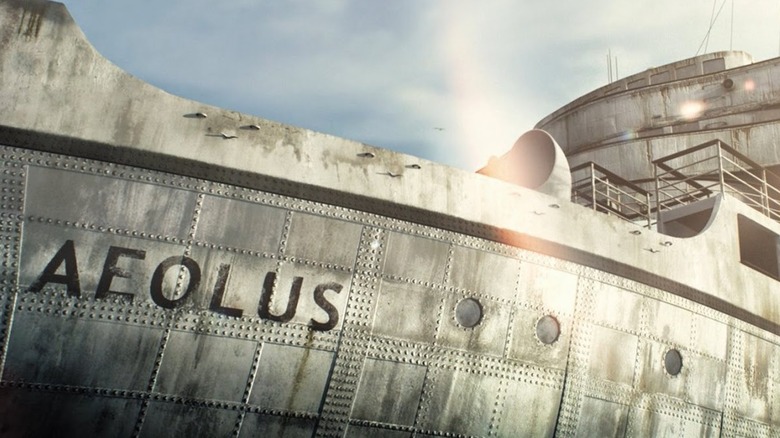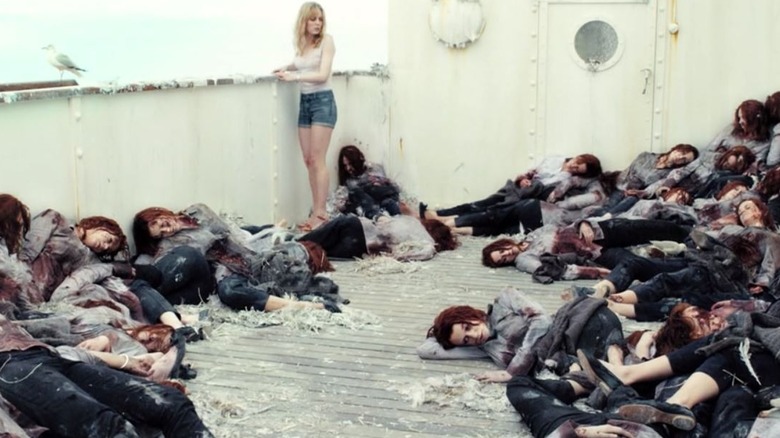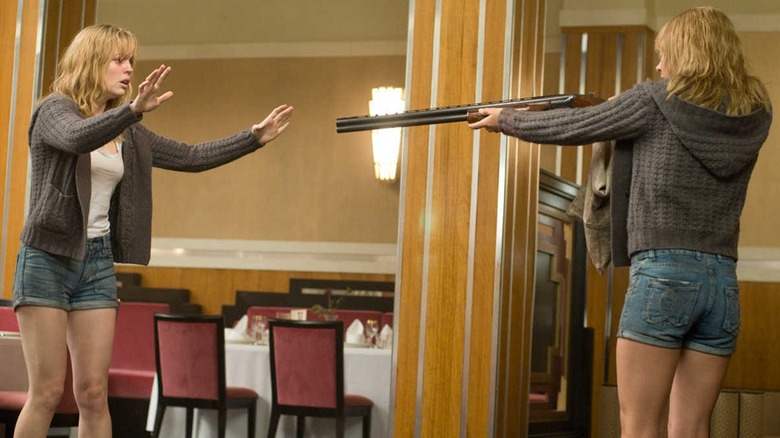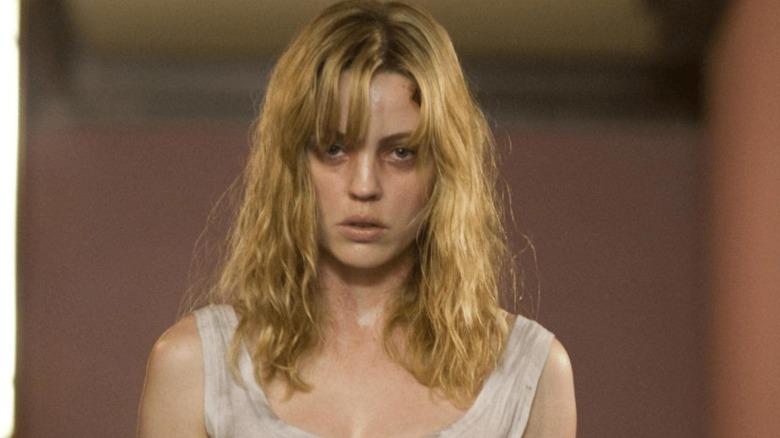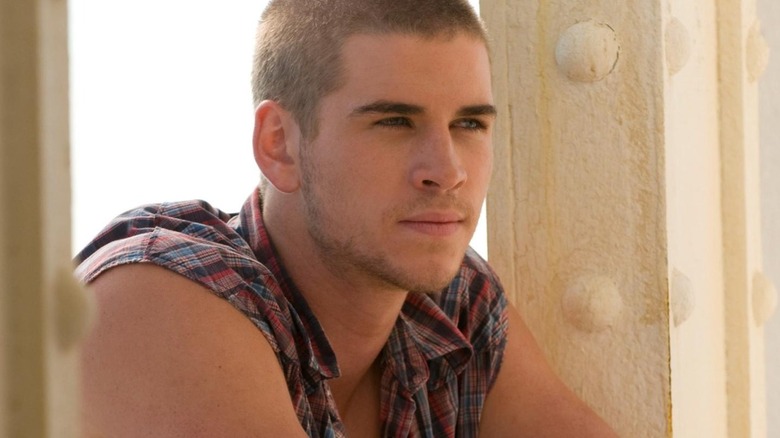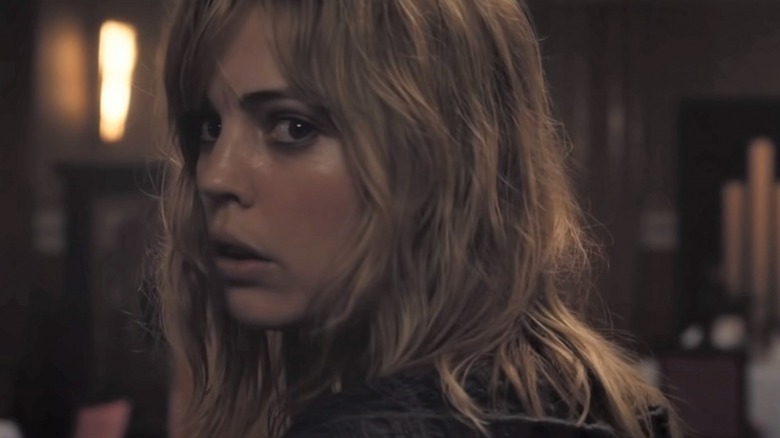The Ending Of Triangle Explained
In 2009 an underrated time travel movie married an original sci-fi premise to some classic horror movie vibes. Written and directed by Christopher Smith, "Triangle" hasn't quite earned cult classic status, but it's still one of the best sci-fi movies of the late 2000s. Anyone who loves a good mind-bending mystery — and isn't deathly afraid of drowning at sea — should definitely circle back to this semi-forgotten film.
The story follows Jess (Melissa George), a woman who's struggling to function as a single mother and who apparently decides to blow off some steam by taking a day trip on a friend's boat. What starts as a fun adventure quickly gets complicated by a massive storm. Things go from bad to worse when Jess and her friends find themselves saved from the elements by a cruise liner called the Aeolus that hides some dark secrets.
Like all good sci-fi movies, "Triangle" raises plenty of questions and mostly leaves them to plague the minds of viewers after the credits roll. There's plenty of time travel shenanigans and mythological references to dig into, but if you don't have the time to plot out the deeper meaning of "Triangle," we've got a full explanation of the story's ending ready to go.
What you need to remember about the plot of Triangle
"Triangle" begins with a brief, somewhat confusing look at Jess and her son at home and getting ready to head out for the day. The film then leaves them behind and catches up with Greg (Michael Dorman), who owns a small boat named Triangle that he runs with his friend Victor (Liam Hemsworth). Greg is taking a small group of friends, including Jess, out on the water for the day. When Jess shows up, her son isn't with her, and she seems a bit lost and confused. After a few minutes on the boat, Jess's brain fog lifts, and the Triangle takes off.
Not long after the ship departs, a massive storm rolls into the area. Everyone on board hears a distress call from another ship, but before they have time to even think about helping, the Triangle capsizes. Almost everyone manages to clamber onto the upside down ship, holding on for dear life until they see a large cruise ship named the Aeolus approaching.
Once Jess and the others jump from the Triangle to the Aeolus, things go from bad to worse. The ship is mostly deserted, but someone wearing a crude mask starts stalking the Triangle survivors. Eventually the masked stranger starts shooting and killing whoever they can, until Jess is the only one left alive. When she runs out onto the deck of the Aeolus, she sees herself and all the other survivors out on the capsized Triangle, approaching the cruise ship all over again.
What happened at the end of Triangle?
Jess figures out that she's stuck in a time loop, eventually learning that the masked murderer on the Aeolus is really a version of herself who's been through the loop multiple times. This future version of Jess keeps killing Greg and everyone else, with the loop resetting each time they all die. Future Jess even leaves notes for her past self, begging Jess to go along with all the killings.
At first Jess tries to stop her future self. She wants to save everyone, and desperately searches for a way to get them off the ship. After repeating the loop several times, she concludes that the only way to save everyone is to prevent them from boarding the Aeolus in the first place. The only way to do that is to reset the loop, so Jess puts on a mask and starts killing everyone.
While fighting with her past self, Jess gets knocked off the Aeolus and washes up on shore. She immediately heads back home to her son, but when she arrives, she sees herself already in the house. Having been transported back to the very beginning of the day, Jess kills her past self and tries to leave town with her son. The two of them get into a violent car wreck, and Jess's son dies. Overwhelmed with grief, Jess goes to the Triangle, where Greg is waiting to take her and his other friends out on the water. Maybe this time around, she'll be able to save her son.
How does the opening scene tie to the ending?
"Triangle" is a movie all about time loops, so naturally the story ends in the same place it began. The opening sequence introduces Jess and her son, and it also gives us the first glimpse into the movie's big mystery. Before she heads to the harbor to meet up with Greg, Jess hears someone ring her doorbell, but when she steps outside no one is there. The first time through, Jess's confusion is a total mystery. In retrospect, it's a dark foreshadowing of the moment near the end of the film when Jess kills her past self and takes her place.
That doesn't necessarily mean that the sequence at the beginning of "Triangle" is exactly the same as what we see near the end of the movie. There's a chance that Jess is trapped inside a time loop that never changes, but her time on the boat seems to imply that Jess has the power to make small changes to the events of each loop. Each time Jess repeats the loop, she has a chance to adjust how everything turns out. The Jess shown in the very first scene of the movie might have still been killed by her time-looping self, but the details probably play out a bit differently than they do when the movie loops back around by the end.
What does the title really mean?
At first glance, "Triangle" might seem like a strange title for the movie. In the context of boats and the open ocean, the word "triangle" conjures up images of the Bermuda Triangle, which would definitely be a good setting for a story about mysterious, borderline magical happenings at sea. We don't get confirmation of where the movie is actually set, so the only "triangle" we know is in the movie for sure is Greg's boat.
We don't know why Greg decided to name his little ship the Triangle, but whatever his reasons, he chose a thematically important name for the boat. In the movie, Jess is trapped in two different kinds of triangles. Her biggest time loop has three different points of reference: her home, Greg's boat, and the Aeolus. On the cruise ship, Jess is up against a whole other kind of triangle. There are three time-looping versions of herself causing chaos on the Aeolus.
As she makes her way through the time loop, Jess can't help but bounce from point to point. And on the cruise ship, the three versions of her can't help but collide into each other. It's funny, albeit in a dark way, that Jess keeps finding herself aboard the Triangle because she's stuck inside a triangle that she can't escape.
Who is Aeolus?
Greg's ship isn't the only one with a deeply thematic name. After the storm capsizes the Triangle, everyone who survives takes shelter on a cruise ship called the Aeolus. The name catches the attention of the characters, and Sally (Rachael Carpani) mentions that the name comes from Greek mythology.
She explains that Aeolus was the god of the winds, but she leaves out some important parts of Aeolus's story that might help us better understand Jess's predicament and the cruise ship's role in her story. Aeolus had two important encounters in Greek mythology that might have something to do with "Triangle." In two different stories, Aeolus meets both the Argonauts and Odysseus when they accidentally land on his home island in the sea. Aeolus tries to help the travelers return home by giving them a bag of wind, but both times someone opens the bag early, sending their ship adrift.
In "Triangle," the Aeolus seems to be a horrifying place that traps Jess inside a time loop, eventually leading her to kill her friends. What if the Aeolus isn't actually a bad place at all? If the ship and its namesake really do share some common traits, it's possible that the Aeolus's time loop is actually an attempt to help Jess. After all, if she doesn't get to restart her day, she'll never have an opportunity to try and save her son. Maybe, like the Argonauts and Odysseus, Jess is just using Aeolus's gift in the wrong way.
Is there more than one time loop?
"Triangle" technically isn't a time travel movie, but it comes with all the confusion typical of that sci-fi subgenre. Trying to keep track of Jess's journey on the Aeolus can definitely leave you with a headache, or at least a need for a big sheet of graph paper. Jess's loop restarts every time her friends get killed, but since Jess is stuck moving through the loop, there are always multiple versions of her running around on the ship.
All the confusion on the Aeolus gets ramped up when Jess gets knocked off the ship. When she washes up on shore, Jess has somehow restarted her entire day, going all the way back to before she was ever on the Triangle. Jess has a chance to completely change the events of the day, but as is often the case in stories that play with time, she can't help but recreate everything that happened to her already.
You could imagine that there's two time loops happening in "Triangle." Jess's whole day is the "big" loop, while her experience on the Aeolus is her "small" loop. That might be the easiest way to understand the events of the movie, but it's also a slightly inaccurate way to imagine what's happening. There's really just the big loop, but on the Aeolus the loop curls in on itself, spiraling until it gets flung back out to the beginning of Jess's day all over again.
Is there more than one Jess?
Whenever a story introduces some kind of time travel, it needs to establish the rules. In "Back to the Future," characters who travel to the past can have a dramatic influence on the future. In the Marvel Cinematic Universe, traveling through time creates entirely different realities, meaning that no one can really alter their own timeline's future. In "Triangle," Jess is something of an unwilling time traveler, and she has to follow a set of rules that are wildly inconvenient and deeply distressing.
There are multiple versions of Jess on the Aeolus at any given time, but they aren't creating branch realities or changing the future. Instead, every version of Jess is really the same woman. The Jess that we follow throughout the movie has a linear experience, and even though it's difficult, it's entirely possible to piece together her story from beginning to end. She loops back through time, but she doesn't travel to the past and alter the future in any real way.
Jess's time travel rules are some of the darkest in the genre. There is never any way for Jess to avoid becoming the masked killer on the Aeolus. She's stuck in a time loop that seems to have completely predetermined outcomes. Of course, Jess thinks that she can change things, and she hopes that she'll be able to break the loop in a significant way, but there's no proof of that actually happening in the movie.
Can Jess ever close the loop?
If Jess is stuck looping back through the same events over and over again, is there any real hope for her? The plot of "Triangle" frames Jess's story as a mystery, which leaves us hoping that she'll find some solution to her problem. The end of the movie leaves us with our biggest question unanswered. Jess goes back to the Triangle to repeat her day, presumably hoping that this time around she'll be able to save her son, but we can't know if that's a real possibility.
What's even worse is that the movie hints that there is no hope for Jess. Remember that at the very beginning of the film, Jess is at home with her son when she hears someone ring her doorbell. We know that the person who rings the doorbell is actually Jess herself, sometime after she escapes the Aeolus. Doesn't that mean Jess has lived through her day multiple times? "Triangle" just shows us Jess moving through her day once, but it clearly isn't the first time that she's done it.
It's a strong possibility that Jess can't break the loop. Maybe she's stuck in time as some form of cosmic punishment for mistreating her son. Maybe she's going to be trapped until she figures out the right way to move through the loop on the Aeolus. Either way, it doesn't look like Jess is going to be free anytime soon.
What has Christopher Smith said about the movie?
It would be easy to classify "Triangle" as a sci-fi movie, but that would only give part of the picture. The movie borrows elements from thrillers and horror flicks to ramp up the tension and add emotional weight to the lofty sci-fi concepts. In fact, the writer-director who created the movie has said that his biggest inspiration wasn't a sci-fi story at all.
In an interview with The Fan Carpet, Christopher Smith opened up about how much his love of Stanley Kubrick's "The Shining" went into his conception and creation of "Triangle." Observant audience members will notice that "Triangle" borrows full shots from "The Shining," which Smith described as "very much [a conscious decision], shamelessly." From the bloody writing on the mirror in the Aeolus to the many intertwining hallways of the cruise ship, Smith tried to bring as much of the horror classic into his movie as possible.
Smith found a way to make his horror movie homages and original sci-fi premise bring out the best in each other. Jess is trapped inside her own horror movie, and as Smith tells it, her prospects by the end of the film might not be looking up. In that same interview, Smith said that he wanted the ending to be ambiguous. "She's either going in proactively and it'll all change or she's got no memory and it's all starting again," he explained. For Jess, the horror just keeps going.
Why hasn't there been a sequel?
"Triangle" came out all the way back in 2009, and despite garnering some very positive reviews, the film never managed to earn a sequel. The movie didn't exactly break any records at the box office, but its lackluster earnings also didn't put a damper on writer-director Christopher Smith's career. He's gone on to direct a plethora of movies and TV shows, and with titles like "The Banishing" and "Consecration" under his belt, it's clear that Smith has continued to be more interested than ever in making horror movies.
But the reason "Triangle" never got a sequel doesn't really have anything to do with the numbers. The truth is that even though the movie leaves us with a huge number of unanswered questions, all that mystery is there by design. "Triangle" isn't supposed to be an open-and-shut story. The ending is meant to keep viewers guessing and to cement the horror of Jess's situation into their minds. Why is she in the loop? Will she ever get out? In the end, the answers don't matter as much as the questions, so any sequel would just end up spoiling the fun.
